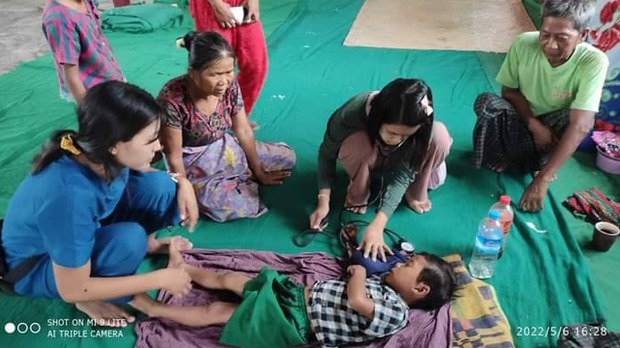Hundreds of Ede families in Vietnam demonstrate to demand land from forestry company
Hundreds of ethnic minority households from a commune in south-central Vietnam’s Dak Lak province are fighting to reclaim their land from a forestry company after 40 years of working on it as hired laborers. Protests in Lang village, Ea Pok town, Cu Mgar district began last month, with farmers demanding the return of about 40 hectares of arable land. Demonstrations came to a head on May 18 when hundreds of people gathered on the land to protest against the coffee company’s destruction of their crops. Videos and photos of the protest were shared on social media, showing riot police clashing with demonstrators. Demonstrations continued last week, with protestors holding up banners asking the coffee company to return the land. State media has so far not reported on the incident. “We want the company to return our ancestral land so that people can have a business in the future,” a local resident told RFA under the condition of anonymity. “People are getting [taxed] more and more but have less land, so people need to reclaim the land.” According to RFA research, Lang village has about 250 households, all indigenous Ede people. The residents all make a living from farming. ‘The company does not give a dime’ Residents told RFA they had been cultivating the land for many generations but after 1975 the local government took it and gave it to the state-owned enterprise, Eapok Coffee Farm to grow coffee trees. The company later changed its name to Ea Pok Coffee Joint Stock Company. Locals went from being landowners to hired workers on their own land. They say the company allowed them to cultivate the land from 1983 until now but told them to produce 18 tons of coffee per hectare or pay for up to 80% of each harvest. “People work hard, but they don’t have enough to eat because they have to pay the company’s output. In many cases, they don’t even have enough output to pay so they are in debt and have to pay for it in the next crop,” said one resident who was assigned to grow coffee on 8,000 square meters of land. Residents say that in 2010 the company allowed them to uproot coffee trees and grow other crops, including corn, but did not support them by offering seedlings, fertilizers, or pesticides. The company also continued to impose output quotas or taxed as much as 80% of the crop. “People have to pay by themselves. The company does not give a dime or give a single pill when people are sick,” said another resident farming 10,000 square meters of land. Struggling farmers decided to file an application with the government in 2019 to reclaim their land and farming rights. Locals say this year Ea Pok Coffee asked them to start growing durian trees. When they opposed the plan the company started destroying crops on May 18 to prepare the land for durian cultivation. When an RFA Vietnamese reporter called Ea Pok Coffee Joint Stock Company to ask for comments they were told the press must register with the company’s leaders, and get their approval first. When asked about the government’s attitude towards people’s demands, a local resident said: “We sent petitions to the town government and the provincial government but got no response. The first time five households signed, then many more households signed. The government always sides with the company, rather than helping the people.” RFA contacted Nguyen Thi Thu Hong, chairwoman of the People’s Committee of Ea Pok town, to ask about the dispute between Lang villagers and the coffee company. She said that she would not accept telephone interviews. When asked if people would agree to maintain the current form of contract farming if Ea Pok Coffee Joint Stock Company reduced taxes and increased support, local people said they still committed to reclaiming the land. Translated by Ngu Vu.



